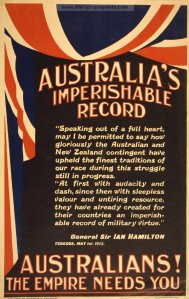Is there a difference between ‘Je suis McIntyre’ and ‘Je sui Charlie’? A thought mused by ‘Gabba’, a commenter on the Daily Mail following an article on how Fairfax journalist Geoff Winestock has stood by the now sacked SBS commentator. Of course, there has not been a violent raid where a number of people have been murdered, but a similar scenario has come to play. That scenario, where a cultural/religious symbol considered sacrosanct has been critiqued, eliciting widespread uproar, resulting in censure and removal from a space which supposedly generates critical and rational discussion. It is fascinating to consider how the ‘Je suis Charlie’ movement galvanised around a perceived threat to the supposed Western value of ‘Free Speech’ and critical thought, and yet we have a member of our public media sacked and shamed for expressing a perspective that is being whitewashed out of our commemorations of wartime history.
Indeed, as Charlie Hedbo were targeted by criminals with authoritarian ideology, we too are seemingly allowing such a scenario to take place in our allegedly liberal society, as a mythology around the nature of our wartime history is built in order to solidify some shape of national identity. Ironic then, that it was forged during an invasion of another land at the behest of the colonial empires; empires which arrogantly stoked chauvinist fires of war all throughout the industrial age. As I have written previously, I have always known ANZAC to be a solemn time to remember family and the tragedy of war. Yet, I am finding that hard to reconcile with the larger than life, clean cut and unassailable narratives of honour and nobility being tacked on like cheap pins to those who did fight. Have we forgotten the nationalist rhetoric and propaganda of the time, which appealed to chauvinist masculinity and adventurism to lure young men away? Have we forgotten the aristocratic European leadership’s blood-thirst for war? Why does the murder of Japanese POWs during the pacific campaign, or the executions of Bita Paka by Australian soldiers have to be whitewashed?
War is never clean cut, noble or honourable. It is a nasty business, that these days, makes the rich and powerful more of the same, and a whole lot of people dead.
It is interesting that the political elite and the dominant conservative mass media help conjure such nationalist myths as a means of manufacturing solidarity and generating political capital for their culture conflicts, yet show a great reluctance to contribute to the ‘great society’ our soldiers have fought for. Indeed, the inability to address the frontier wars and the bloodshed they wrought on Aboriginal societies, or the steadily growing inequality in Australia. We have a political system that seems more concerned in preserving the interests of the wealthy and paralysed on the fundamental problem of climate change and environmental degradation — mortal threats to our society and well-being.
The sacking of McIntyre is perhaps an excellent example of a rot occurring in Australia. A fundamental failure of our leadership to act in our interests and to uphold the values that regularly drop like spittle from their mouths. An increasing bent of Authoritarian zeal at the expense of those who died during the military forays Australia has participated in, where values of ‘honour’ and ‘sacrifice’ are assigned to events in which they may have not existed in such absolute terms. I do not have a problem with commemorating our fallen, but we also have to remember the cost that war incurs on all. That we were not always on the ‘right’ side of a conflict, or even have a right to enter a conflict. We have to acknowledge the warts where they exist and not allow a false narrative to be created, which will inevitably be used as a means of justification for more war. McIntyre lost his job for expressing dissent, which is another side of our war history. He was not tactful or nuanced, nor was he necessarily wrong. McIntyre had the misfortune of calling into question a sacred lamb and the rituals we have enacted around it.
Je suis McIntyre?

